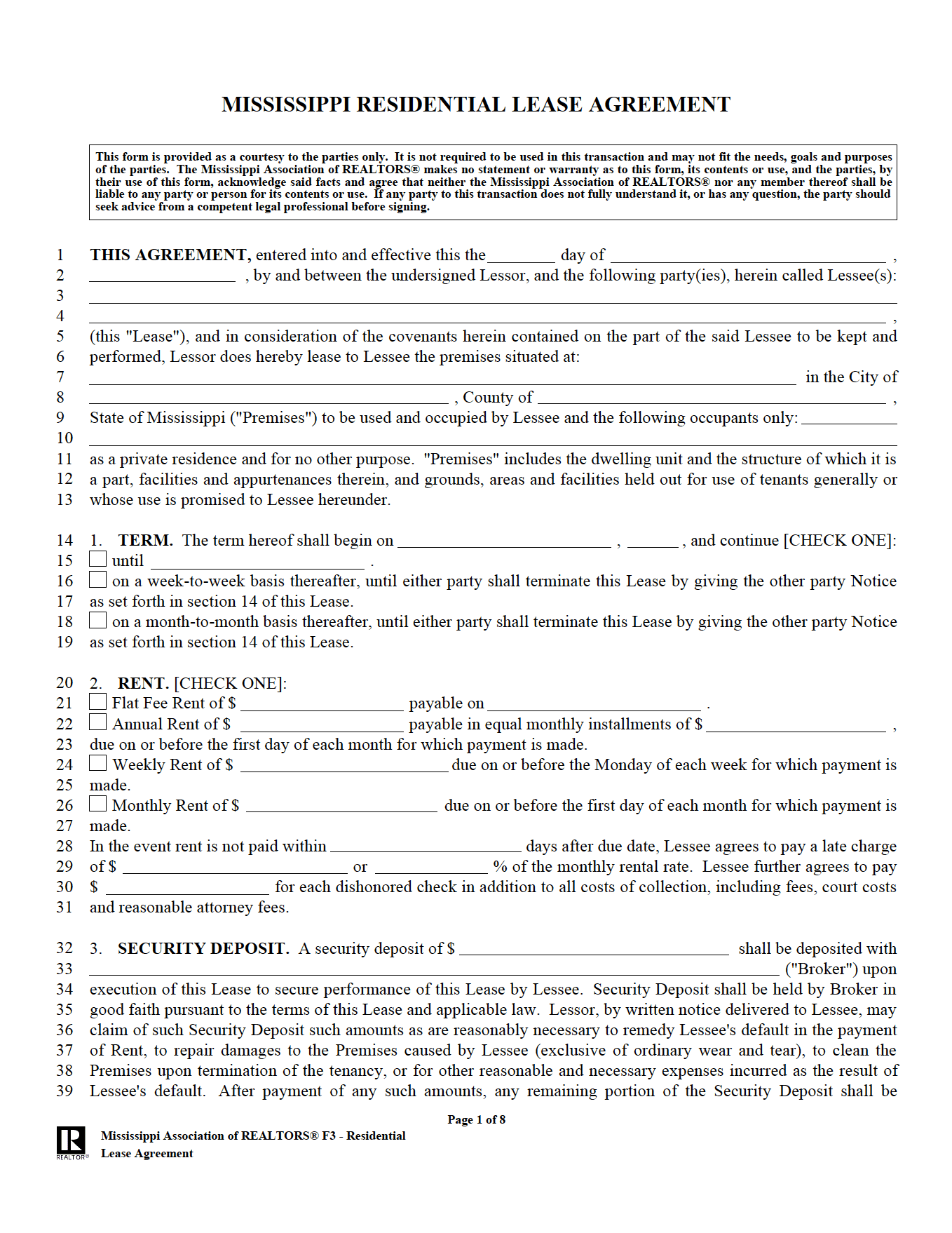Mississippi Rental Lease Agreement Templates
The Mississippi Rental Lease Agreements are written forms used by property managers for the renting of an apartment, home, condo, office, or building. The agreements establish a set of binding requirements for the landlord and tenant(s) that stay in effect for the full length of the lease. The form serves as a neutral reference point, allowing the parties to go back to it in the event of an altercation or a similar issue. Before being signed, the landlord and tenant(s) will sit down and go over each section of the lease to ensure everyone agrees with each point. Although negotiation can occur, it is more common in commercial leasing, where the tenant(s) are business owners.
Types (6)
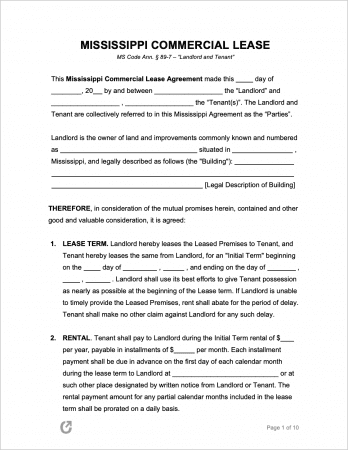 Commercial Lease Agreement – An editable template used by owners of lots and buildings that are approved for leasing to business tenants.
Commercial Lease Agreement – An editable template used by owners of lots and buildings that are approved for leasing to business tenants.
Download – Adobe PDF, Word (.docx)
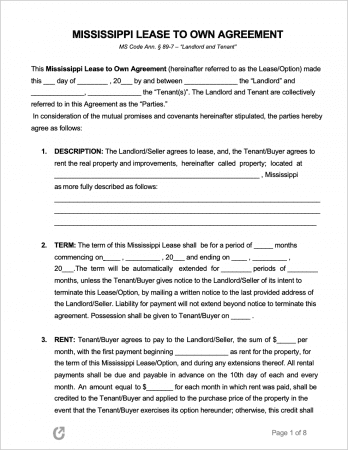 Lease to Own Agreement – Used by homeowners looking to form a lease that permits tenant(s) to purchase their home at the end of the lease (if the tenants so choose).
Lease to Own Agreement – Used by homeowners looking to form a lease that permits tenant(s) to purchase their home at the end of the lease (if the tenants so choose).
Download – Adobe PDF, Word (.docx)
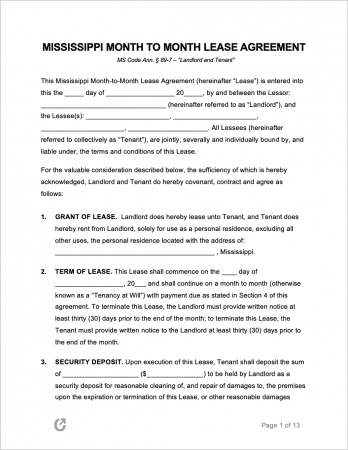 Month-to-Month Rental Agreement – Used for leasing vacation homes and other types of property for single months at a time. Can be terminated by either party with minimal notice.
Month-to-Month Rental Agreement – Used for leasing vacation homes and other types of property for single months at a time. Can be terminated by either party with minimal notice.
Download – Adobe PDF, Word (.docx)
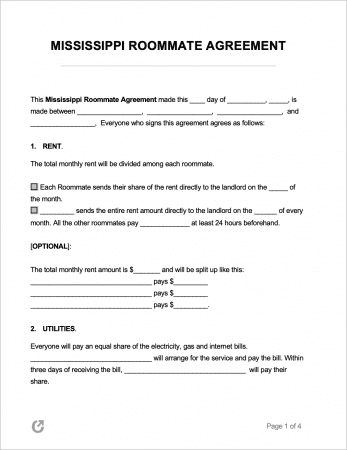 Roommate Agreement – Completed by roommates to encourage the forming of rules regarding common living topics such as guests, personal belongings, shared utility/rent, and much more.
Roommate Agreement – Completed by roommates to encourage the forming of rules regarding common living topics such as guests, personal belongings, shared utility/rent, and much more.
Download – Adobe PDF, Word (.docx)
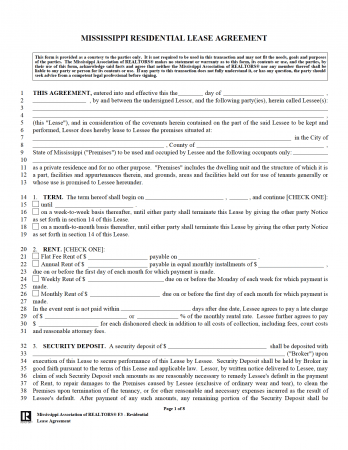 Standard Residential Lease Agreement – The most commonly used leasing document – signed by a landlord and tenant(s) for leasing rentals on a yearly basis.
Standard Residential Lease Agreement – The most commonly used leasing document – signed by a landlord and tenant(s) for leasing rentals on a yearly basis.
Download – Adobe PDF, Word (.docx)
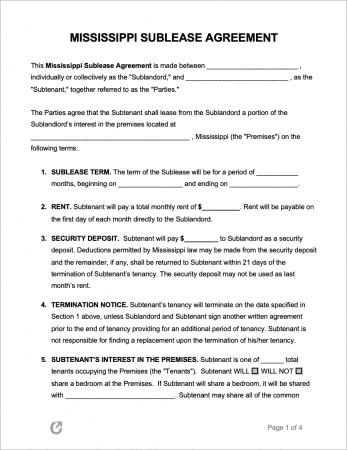 Sublease Agreement – An agreement that details the circumstance whereby a sublandlord (the original tenant) leases part or all of a rented property to a subtenant.
Sublease Agreement – An agreement that details the circumstance whereby a sublandlord (the original tenant) leases part or all of a rented property to a subtenant.
Download – Adobe PDF, Word (.docx)
What is a Mississippi Lease Agreement?
A Mississippi Lease Agreement is a document that establishes a legal record of a given landlord-tenant relationship. Both parties should be able to understand each and every provision so that they fully comprehend how they must conduct themselves. If landlords are still in the process of selecting a suitable tenant, they should distribute rental applications to any individuals they are considering.
State Laws & Guides
Laws
Landlord-Tenant Guides / Handbooks
When is Rent Due?
As state law does not dictate when rent is due, this should be spelled out in the lease agreement. Generally, rent is due on the first of the month. State law does not provide for a grace period, however, landlords wishing to do so can specify this in the lease agreement.
Landlord’s Access
Emergency: There is no state statute regarding landlord access in emergency circumstances. That being said, landlords have the right to enter the rental dwelling without notice in emergency circumstances, as protected by federal law.
Non-Emergency: Mississippi state laws do not provide guidance on the matter of non-emergency landlord access. The rental contract should thus specify this matter in detail. It is recommended that landlords give reasonable notice of at least twenty-four (24) hours prior to entry. Landlords are also advised to only enter on Monday through Friday from 9 a.m. to 6 p.m.
Landlord’s Duties
As stated by § 89-8-23, landlords are required to uphold the following duties for the course of the rental agreement:
- Comply with all building codes relating to the health and safety of the tenants (as required by state / local code),
- Keep all plumbing, electrical systems, appliances, etc. in the same condition (not including normal wear and tear), unless the tenant(s) damage them.
Tenant’s Duties
Tenants are required to comply with the following obligations, as stated by § 89-8-25:
- Keep the rental clean,
- Throw away all trash (cleanly and safely),
- Maintain plumbing appliances/fixtures as reasonable,
- Not engage in illegal activities on the premises,
- Maintain the rental as it was when the tenant(s) moved in,
- Let the landlord know if there is anything that is or can cause damage to the rental,
- Refrain from disturbing nearby tenants, and
- Use everything included in the lease as it’s supposed to be used (and refrain from damaging the rental negligently or purposefully).
Required Disclosures
- Lead Paint Disclosure: The only disclosure legally required in any Mississippi rental agreement is one established by federal law. That is, landlords of rental properties that were built before 1978 are required to disclose any known lead paint hazards to tenants. Moreover, they must furnish a copy of a government-issued pamphlet on the topic.
Security Deposits
Maximum: State law does not place a cap on the maximum amount a landlord can charge a tenant for a security deposit.
Returning to Tenant (§ 89-8-21(3)): Landlords must return tenant’s security deposits within forty-five (45) days after the termination of tenancy. If there are any deductions the landlord will make due to damages caused by the tenant, the landlord must furnish the tenant with a written that itemizes the amounts claimed.
Deposit Interest: No statute.
Uses of the Deposit (§ 89-8-21(3)): Landlords can lawfully make deductions from the deposit for the following reasons:
- To cover the nonpayment of rent,
- To fix tenant-caused damage to the rental (that weren’t a result of usual wear and tear),
- To pay for the rental premises to be cleaned (if the tenant(s) didn’t do a good job of cleaning, themselves), and
- To cover any other expenses that resulted due to the tenant’s default.
